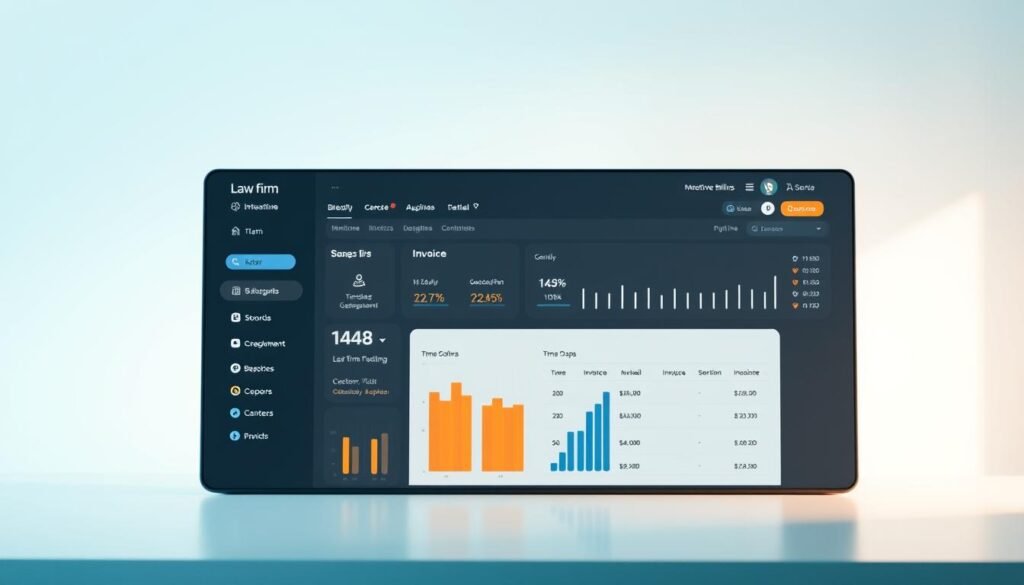Did you know that nearly 70% of law firms are leveraging legal billing software to enhance operational efficiency? This figure underscores the rapid evolution of billing processes in the legal sector. As firms aim to meet the tech-savvy demands of clients, the importance of legal billing software is escalating. This shift mirrors broader legal tech trends, emphasizing automation, real-time updates, and seamless integrations.
Leading companies like Clio, Bill4Time, and Timeslips are pioneering innovative solutions. These solutions cater to the evolving needs of both firms and their clients. Adopting these changes is not merely about staying competitive. It’s about transforming traditional billing practices into streamlined, efficient processes. These processes enhance collaboration and client satisfaction. The future of legal billing software is here, and it’s imperative for law firms to adapt.
Key Takeaways
- Legal billing software is increasingly utilized by law firms, with nearly 70% of firms adopting it.
- Automation and real-time updates are reshaping billing processes.
- Key players like Clio, Bill4Time, and Timeslips are driving innovation in legal tech.
- Adapting to legal tech trends is essential for maintaining a competitive edge.
- The future of legal billing is focused on enhancing client satisfaction and operational efficiency.
Evolving Trends in Legal Billing Software
The legal billing software landscape is undergoing profound transformations, driven by technological innovations. These advancements are aimed at boosting efficiency and improving client communication. Automated invoicing solutions are at the forefront, enabling legal professionals to streamline their billing processes. This automation significantly reduces the time spent on administrative tasks, reshaping financial management within law firms.
Increased Automation in Billing Processes
Automated invoicing solutions empower law firms with the capability to generate invoices with ease. These systems diminish errors and ensure invoices are sent on time. This allows attorneys to dedicate more time to their cases. Moreover, firms adopting automated processes experience enhanced cash flow and quicker payment cycles.
AI and Machine Learning Impact on Billing
AI in legal billing is pivotal in refining billing strategies. By employing machine learning algorithms, firms can dissect billing data to uncover patterns and optimize billable hours. Technologies like those from Luminance and LegalSifter improve billing precision through real-time data analysis and decision support. This offers a significant competitive advantage in the legal sector.
Importance of Real-Time Updates
Real-time billing updates have become crucial as clients increasingly demand transparency. Law firms that provide these updates ensure continuous communication and timely billing status notifications. This transparency builds client trust and satisfaction, essential for fostering enduring client relationships.
Understanding Legal Billing Software
Law firm billing software is crucial for daily operations in legal practices. It boosts billing efficiency and offers features tailored for law firms. With advanced billing technology, attorneys can better manage time, track expenses, and nurture client relationships.
Definition and Key Features
Legal billing software simplifies invoicing for law firms. Key features include:
- Time tracking for precise billable hours.
- A billing calendar for scheduling invoices.
- Modules for client management to keep client data current.
These features help law firms use invoice tracking software to track payments and improve billing precision.
Benefits for Law Firms
Implementing law firm billing software brings significant benefits. It leads to fewer billing disputes with clients and facilitates timely payments. Law firms can build stronger client relationships by offering easy invoice access and transparent billing. Platforms like ProLaw and PracticePanther showcase these advantages with their essential features for modern legal billing.
The Shift to Cloud-Based Solutions
The legal billing sector is witnessing a profound transformation, with law firms increasingly adopting cloud-based solutions. This shift aligns with the latest legal tech trends, highlighting the importance of modern, efficient, and accessible practices. Cloud-based billing platforms bring numerous benefits but also necessitate careful consideration of security concerns.
Advantages of Cloud Technology
Cloud technology significantly improves billing processes through several key advantages:
- Increased Accessibility: Cloud solutions allow lawyers to access billing information from anywhere, enhancing flexibility in today’s mobile work environment.
- Cost Savings: Cloud services reduce hardware and maintenance costs, making them a cost-effective option for law firms.
- Collaboration Enhancement: Teams can collaborate seamlessly, regardless of location, improving communication and project workflows.
Security Considerations
Despite the benefits, security remains a critical concern with cloud-based billing platforms. Law firms must adhere to regulations and implement stringent security measures. Solutions like MyCase and Zola Suite demonstrate how to balance comprehensive digital payment integration with reliable security, protecting client data while optimizing billing functions.
Integrating Legal Billing with Practice Management
The integration of law firm billing software with practice management systems marks a pivotal shift in legal technology trends. This synergy significantly enhances operational efficiency and billing accuracy. By aligning billing with case management tools, law firms can optimize their workflows effectively.
Streamlining Operations
When billing and practice management are integrated, law firms see a decrease in manual data entry and errors. This integration facilitates:
- Real-time updates of client billable hours and expenses
- A unified platform for tracking cases and financials
- Automated invoice generation from activity logs
Law firms using software like Clio benefit from managing case details alongside billing tasks. This ensures efficient resource utilization and maximized productivity.
Enhanced Collaboration Among Teams
Collaboration within legal teams is significantly improved with integrated billing systems. Enhanced visibility into case financials enables:
- Informed decision-making
- Optimal resource allocation based on current workloads
- Streamlined communication among team members
These improvements allow firms to work cohesively. They can focus on delivering high-quality legal services while efficiently managing billing operations.
The Role of Compliance in Legal Billing
Ensuring compliance in legal billing is paramount for law firms operating in a complex regulatory environment. Adherence to state bar rules and ethical standards is crucial. It not only maintains the integrity of billing practices but also safeguards the firm’s reputation. By establishing structured procedures, firms can protect themselves from legal pitfalls.
Adhering to Regulatory Standards
Legal practices must adhere to applicable laws with utmost diligence. This involves regular assessments of billing practices to meet state bar standards. Consistent audits are vital for detecting discrepancies and promoting transparency. A solid compliance foundation fosters client trust and loyalty.
Best Practices for Compliance
Several strategies can improve compliance in legal billing:
- Maintain accurate billing records: Keeping billing information up-to-date is crucial for accuracy and accountability.
- Utilize automated invoicing solutions: Tools like TimeSolv can streamline compliance by ensuring bills are accurate and compliant with regulations.
- Train staff on compliance requirements: Continuous education empowers staff to understand and uphold compliance effectively.
Customization and Client-Specific Solutions

In today’s legal world, customization is key. Law firms seek billing software that meets their unique needs. Client-specific solutions offer tailored features, boosting satisfaction and fostering enduring relationships.
Tailoring Software to Client Needs
Customizing law firm billing software enhances the client experience. By adjusting features to fit each client’s specific needs, firms can provide personalized service. This includes custom billing formats, specialized reporting, and flexible invoicing processes that match client expectations.
Examples of Custom Features
Leading providers, such as Bill4Time, offer scalable solutions with client-specific options. Custom features include:
- Custom billing templates that align with client branding.
- Detailed reports that offer insights into case costs and timelines.
- Flexible payment options tailored to client preferences.
- Personalized dashboards for clients to track billing and usage easily.
The Rise of Subscription-Based Pricing Models
The legal sector is undergoing a profound transformation with the integration of subscription-based pricing models. This shift mirrors evolving consumer preferences and aligns with the latest legal tech trends, emphasizing adaptability and efficiency. Law firms are discovering the merits of subscription pricing, which offers a more stable financial environment.
Benefits of Subscription Over Traditional Models
Cost predictability stands as a cornerstone benefit of subscription-based pricing models. Law firms can better manage their finances, avoiding the significant upfront costs characteristic of traditional pricing methods. This strategy enables firms to access vital services while maintaining control over their expenses.
- Reduced financial risk: Firms encounter less uncertainty regarding long-term commitments.
- Access to premium features: Subscription models frequently include advanced features that are continually updated.
- Improved budgeting: With consistent monthly fees, law firms can allocate resources more effectively.
Flexibility and Scalability
Subscription-based pricing models empower law firms to tailor services to their unique requirements. As firms expand or experience shifts in demand, they can modify their subscription plans effortlessly, without the need for contract renegotiations. Software like Rocket Matter exemplifies this adaptability, simplifying billing and operations within a scalable framework. For firms aiming to enhance their agility in a rapidly evolving landscape, exploring subscription models could be advantageous.
Mobile Accessibility and Its Importance
In today’s fast-paced legal landscape, mobile accessibility has emerged as a transformative force. Law firms must evolve to meet the escalating need for mobile solutions. Cloud-based billing platforms empower attorneys to deliver services efficiently, whether in the office or at a client’s site.
Implementing the right mobile features can profoundly enhance client service and streamline billing processes. Key mobile functionalities for law firms include:
- Time tracking capabilities for precise billing.
- Invoice generation that can be executed instantly.
- Mobile payment options to streamline transactions.
Platforms such as Clio and MyCase stand out by offering these functionalities. They ensure attorneys can access their billing software from anywhere. This adaptability not only boosts billing precision but also accelerates the billing cycle. Thus, mobile accessibility is a critical factor for contemporary law firms.
User Experience and Interface Design

The evolution of law firm billing software places a significant emphasis on user experience (UX) and interface design. An intuitive design enables users to navigate complex billing processes effortlessly. With the integration of cutting-edge billing technology, firms can significantly enhance usability. This leads to increased user engagement and satisfaction. Optimizing design facilitates streamlined workflows and enhances interactions.
Importance of Intuitive Design
Intuitive design plays a crucial role in legal billing software. It simplifies the user journey, reducing the learning curve for new users. Tools like FreshBooks captivate users by presenting information clearly, minimizing resistance to adopting new technologies. Features such as easy-to-follow menus and customizable dashboards ensure quick access to vital functions.
Improving User Engagement
Enhancing user engagement hinges on providing seamless interactions within the software. The integration of visually appealing layouts and responsive designs allows users to focus on their tasks without distractions. Law firms utilizing modern tools can expect a significant increase in productivity. Engaging features that offer real-time updates and notifications keep users informed. For more on effective legal e-billing practices, click here. Incorporating user feedback into design iterations ensures continuous improvement, highlighting the importance of user-centered approaches.
Exploring Integrations with Other Software
Integrations with other software systems have become crucial for law firms. They enable firms to streamline processes, improve communication, and boost efficiency. Key integrations include accounting platforms, document management systems, and customer relationship management (CRM) tools.
Popular Integrations for Law Firms
Law firms leverage various integrations to enhance their operations. Notable examples include:
- QuickBooks for financial management
- Clio for comprehensive practice management
- DocuSign for electronic signatures and document workflows
- Salesforce for client relationship management
These tools facilitate a smooth exchange of information. For example, QuickBooks integration allows for real-time financial tracking. This aids law firms in making more informed financial decisions.
Benefits of Integrated Software Ecosystems
Implementing integrations for law firms offers several key advantages:
- Improved Data Accuracy: Reduces errors by minimizing manual data entry.
- Enhanced Collaboration: Fosters better communication among teams by sharing data easily.
- Operational Efficiency: Automates tasks, saving time and resources.
- Data-Driven Insights: Allows firms to harness analytics for better decision-making.
For more insights into software integration capabilities, consider checking this resource. Embracing integrated ecosystems can significantly elevate a law firm’s performance. It makes the firm more agile in a competitive landscape.
Well-thought-out integrations for law firms are driving innovation in legal technology. By staying ahead with these trends, firms can improve their service delivery and client satisfaction through integrated solutions.
Future Technologies Impacting Legal Billing
The legal billing sector is undergoing a significant transformation, driven by technological progress. These advancements promise to boost efficiency, accountability, and strategic decision-making for law firms. Blockchain technology, in particular, offers a secure and transparent framework for billing processes. Meanwhile, big data analytics provides deep insights into client relationships and billing practices.
Blockchain and Its Implications
Blockchain technology introduces a decentralized ledger system, significantly impacting legal billing. It creates immutable records, enhancing both transparency and security. This allows firms to track billing transactions in real-time, minimizing the likelihood of disputes. The ability to validate changes in billing entries ensures clients receive accurate invoices, fostering trust.
As firms embrace blockchain, they recognize its potential to streamline operations. This technology is becoming increasingly prevalent in legal settings, promising to revolutionize billing processes.
Exploring Big Data in Legal Billing
Big data is crucial in shaping the future of legal billing technologies. Analytics enable law firms to identify patterns and trends in billing practices, guiding better decision-making. This leads to enhanced client relationships as firms better understand their clients’ needs.
By analyzing client interactions and billing histories, firms can refine their strategies. Companies like LedgerDocs are leveraging big data to improve their billing systems, offering tailored solutions. This integration of big data analytics is transforming the legal billing landscape.
Law firms must adapt to these technological advancements to thrive. Understanding the implications of blockchain technology and big data is vital. By embracing these innovations, firms can optimize billing processes and deepen client engagement. For more insights, explore this informative article.
The Role of Client Communication Tools
In the legal sector, client communication tools are indispensable, especially when paired with law firm billing software. They ensure clients are abreast of their billing status, building trust and satisfaction. This transparency is key to fostering smoother interactions and maintaining a professional image.
Keeping Clients Informed
Timely updates are vital for any legal practice. Client communication tools allow firms to keep clients informed about:
- Billable hours accrued
- Outstanding fees and payment statuses
- Upcoming invoices and due dates
Platforms like PracticePanther automate notifications, ensuring timely updates to clients. This proactive approach reduces misunderstandings and highlights the value of the services provided.
Improving Client Satisfaction
Client satisfaction is directly tied to clear, consistent communication. Effective client communication tools not only inform but also elevate the client experience. Promptly addressing queries and concerns strengthens relationships. Features that enable quick responses and feedback collection empower clients, fostering loyalty and higher retention rates for law firms.
Innovations on the Horizon
The legal sector is undergoing a transformation, with innovations in legal billing at the forefront. These advancements promise to revolutionize the industry, streamlining processes and elevating client satisfaction. The future of legal technology is brimming with potential, offering a plethora of opportunities for growth and improvement.
Upcoming Features in Legal Billing Software
Several key areas are set to see significant improvements in legal billing software:
- Enhanced AI functionalities that simplify time tracking and invoicing.
- Greater integration with payment systems, enabling faster transaction processing.
- Advanced analytics tools that provide actionable insights for forecasting and reporting.
Law firms, including those associated with LexisNexis, are keen to embrace these advancements. The integration of these technologies will likely revolutionize billing practices, promoting greater efficiency and reducing manual oversight.
Predictions for the Next Decade
Looking ahead, the evolution of innovations in legal billing is expected to mirror broader technological trends. Predictions suggest:
- A shift towards fully automated billing systems that require minimal user intervention.
- Enhanced mobile capabilities, enabling lawyers to manage billing on-the-go.
- Increased collaboration tools that enhance communication within legal teams regarding billing matters.
Law firms that adapt to these changes stand to gain significantly. Staying abreast of the future of legal technology will be crucial for maintaining a competitive edge in the marketplace.
Conclusion: Embracing the Future of Legal Billing
The legal technology landscape is rapidly evolving, necessitating that law firms remain abreast of emerging trends. The advent of advanced legal billing software heralds a new era of efficiency and client engagement. By embracing these innovations, firms can streamline their operations and deliver superior client experiences.
The Importance of Staying Informed
Legal professionals must commit to continuous learning to navigate the ever-changing landscape of legal billing software. Engaging in ongoing education on the latest technologies empowers firms to make informed decisions. This adaptability ensures that firms not only meet billing challenges but also emerge as industry leaders.
Preparing for Change in Legal Practice
Adaptation to the swift advancements in legal billing is crucial. Law firms should cultivate a proactive mindset, ready to adopt innovations that transform their billing processes. Investing in flexible software systems and continuous staff training can yield substantial benefits. Firms that proactively prepare for and leverage these changes will lead the legal practice into its future.
